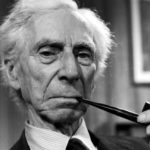How Aquinas’s First Mover is Also Universal Governor
by Dr. Dennis Bonnette
Filed under God's Nature

This post aims at better understanding how God interacts with creatures, not primarily at proving his existence. Central objections to God’s existence are that (1) his nature is self-contradictory and/or (2) his relation to creatures is somehow impossible, as in, for example, the problem of evil that I have addressed here previously.
In other posts, I have argued that God is the source of all “new existence” that appears in the world every moment it progresses through time. Regarding St. Thomas Aquinas’s Fifth Way to prove God’s existence, I have argued that every non-knowing agent’s final causality requires intellectual foreknowledge of the end to be achieved – right down to the least aspect of its existence.
Some conceive God as distant from his creation: he causes it to begin, gives it natural laws, and intervenes only where necessary – say, to create the human spiritual soul or to bridge alleged “evolutionary gaps.” Otherwise, God stands back in deistic fashion letting his physical laws run the “day to day” operations of the universe.
But, metaphysical science proves that God not only creates the cosmos at its beginning, but also continuously sustains its existence lest it fall back into nothingness. For, proper causes are simultaneous with their effects, and, as St. Thomas points out in his Second Way, “to take away the cause is to take away the effect.”1
My articles on “New Existence” and on the “Mysterious Fifth Way” penetrate further. They argue that God constantly impacts the world (1) by accounting for every new aspect of existence that appears in our ever-changing cosmos and (2) by directing with foreknowledge all finite agents to the exact end which results either by their self-perfective actions or by their production of effects.
God: Universal Source of All "New Existence"
My own variation on St. Thomas’s First Way notes the absolute moment to moment limits on each and every existent in our ever-changing cosmos. This realization implies that even the least change in the way things exist is totally inexplicable in terms of the previous state of total finite reality. This is because all the qualities of reality, all the perfections of existence, that were present in the “before” state of the cosmos do not include the new qualities of existence that appear in the “after” state of the ever-changing cosmos. Since what prior states lack in being cannot explain the “new being” of later states, there must be some “universal source or donor” of these new qualities – something already possessing these qualities that are “new” to the finite world, but not to that universal source.
I have shown elsewhere that there must be an Infinite Being to create and sustain the world’s existence. Since that Infinite Being is the infinite cause of all that exists, it must contain all possible qualities of existence itself. Thus, it must be identical with that Universal Source of all new qualities of existence that appear in our ever-becoming cosmos. For, becoming is the coming-to-be of new existential qualities. Thus, the Infinite Being must also be the Universal Source or Donor that creates these new qualities of existence, whether substantial or accidental in nature.
Clearly, the roles of creator and sustainer of all being and of all becoming befit the God of classical theism.
As Universal Source, God cannot undergo any change, since to do so – even to go into the act of causing new qualities in others – would be to gain a new mode of existence he did not have to give new being to himself, which is impossible.
As Infinite Being, there can be only one God, since, were there two, the necessary difference between them would entail one lacking something the other had. The one lacking something would be merely another finite being.
Because of the divine simplicity, God’s infinite being is identical to his infinite knowledge, whereby he knows all creatures perfectly in the act of knowing himself as their cause.
God gives to finite beings all the new qualities they manifest as they undergo even the least alterations. God’s causality reaches down to the least iota of new reality in finite things. As St. Thomas says, “But the causality of God, who is the first agent, extends to all being (entia) ….”2
Efficient Causes Fail to Explain Final Causality
The final causality St. Thomas’s Fifth Way depicts is rejected by scientific materialists who attempt to explain all cosmic change just in terms of efficient and material causes. This tendency arises because they think that as long as physical agents can produce effects, efficient causality (matter being assumed) is totally responsible for the effect produced.
But that is to confuse efficient causality with the entire physical agency taking place.
In truth, a physical agent exhibits both efficient causality and final causality. But, the latter is not reducible to the former. Efficient causality explains why some effect is produced, whereas, final causality explains why this specific effect, as opposed to any other, is produced. Of course, both diverse sufficient reasons influence the actions of a physical agent. But, to reduce the entirety of the agent's causality just to efficient causality is to confuse the whole with a part.
Final causality operates in conformity with the formal cause, which specifies which activities are proper to a given agent. But the formal cause itself is, in a way, static. It is there even when the agent is not acting for an end. For the agent to begin to act for a definite end there must be a sufficient reason why this particular end is actively moved toward, rather than any other, and this reason must be operative from the very beginning of its motion, or else, nothing definite could be accomplished.
Assuming the physical agent as the total explanation of the results which it produces risks confusing the entire causal process with subsets of various intelligible reasons that partially explain it. Final causality is a unique principle that must be present in order to explain certain aspects of the total causal process which are not explained by matter, efficient causality, or even substantial form.
Perfect Intellectual Knowledge of Ends Exists
As explained in an earlier article, the principle of final causality entails two claims: (1) that every agent must act for an end and (2) that there must be intellectual knowledge of that end. St. Thomas supports the latter claim when he affirms that “… those things which do not have knowledge do not tend toward an end unless directed by something with knowledge and intelligence….”3
Thomists make the following type of argument in support of St. Thomas’s claim:
“We see, therefore, that the sufficient reason for an agent’s action, that which determines it to a particular action or effect rather than any other is the effect, the action itself – not as produced and accomplished, but as that which is to be produced, accomplished and therefore as preconceived by a thought, so as to preordain the agent to that action.”4
However, skeptics dispute how something which does not even presently exist – something that is only yet “to be produced” can possibly determine which end is achieved, and especially that it should be claimed to “retroactively” act on the natural agent from the very beginning of its agency. Rather, they claim that this is explained by existing efficient causes, which they identify with physical agents.
Still, consider looking at this finality starting with the end as already attained. Now this end is not a “mere possibility,” but rather something already existing and needing a full causal explanation of how it came to be.
When beginning at the "future point," you can look back and say that the natural agent's former state is the explanation. But the problem is that when you examine the "explanation," you find that what was needed was a causal influence aimed at producing the now "present" state – actually guiding the entire causal process to this unique actually-achieved end.
This makes the reality of the present intelligible only if a real causal influence in the past was operative and moving the agent to its present state. Since the formerly future, now present state, is an actual reality, so must have been real the causal influence oriented to the now present state's production.
This means that when you focus on the end as actually achieved, it is no longer just a mere possibility, but a reality that can only be explained by a sufficient reason in the past that was actually aimed at its fruition.
While final causality present in the natural agent is retrospectively discerned, it exists and operates prospectively in the natural agent at the point at which it begins its agency.
But since the end did not exist extramentally at the beginning of the agent’s action, its active guidance toward the end achieved is intelligible solely if it had retroactive influence by existing in the intellect of an intelligent director guiding the agency to its final end.
Since some intellect knows the end before the agent can begin to act, what precisely is the nature of that end? Is it some sort of general end, as, say, a dog knows when wolfing down food? While the dog senses a sensible good to be eaten, it does not know the exact food it will actually eat as it wolfs it down.
What of man? Doesn’t he know his acts exact ends – and the means, as means, to those ends? The difficulty is that human intellectually-known ends abstract from concrete circumstances of actual ends. He aims to graduate, but does not know the exact point average he will earn. Human intellectual knowledge simply cannot attain the existential uniqueness of the end as actually attained. We mark success in broad terms (he graduated), but not with foreknown concrete existential uniqueness (2.14 QPA).
The problem is that the actual term of every agent’s action is the end as actually and concretely attained, not some abstract “target range.” Since the actually attained end is never precisely identical to the end as known by man, something else must exist which intellectually knows the actually attained end with perfect existential precision.
What Agents Actually Cause: New Existence
While causal explanations are usually given in terms of broadly-conceived and essentially attained ends, extramental reality itself does not exist abstractly. Real things are always concrete, particular, and existentially unique. Despite claims that natural science alone achieves knowledge of the physical world that is “scientifically accurate and precise,” natural science itself never describes reality exactly as it exists. Every measurement and prediction is couched in terms of approximation no matter how precisely stated. Even objects described in the smallest possible units of physical measurement, Planck units, still represent a certain degree of abstraction from reality itself, always requiring that telltale “plus/minus” at the end of a number.
Thus, any cosmic causal process that produces change or coming-to-be must produce actually existing unique beings not mere approximations or concepts abstracted from concrete reality. This applies to the “new existence” described earlier. Since any cosmic change causes new limited being, and since every being or aspect of being is unique, any change in finite reality requires that some being gives that new unique form of existence which comes into being. Since every finite thing is limited to its present way of being, and since any new thing or change of being has never existed before in quite its new existential uniqueness, no mere finite cause can actually give, of itself, that new existence. This is so precisely because it lacks that form of existence which differentiates the newly acquired form of existence from itself, and hence, cannot account for its coming-to-be.
Yes, this is an argument for the existence of an infinite being which already possesses every possible mode of existence, and to which any newly manifested change in finite being is not new, but simply part of what that infinite being already possesses. This Universal Source of existence is the Infinite Being called God.
What Agents Actually Cause: Finality
But just as God can be understood as the Universal Source of all new and unique finite becoming, so can he be understood as the Mind that knows the intentionality that attends all final causality.
I say this because every result of finite agents acting for an end is also existentially unique and new never identical to anything that has ever existed before.
Finite natures do not routinely produce the same exact effect, but always some unique variant that falls within the possibilities of that nature. Birds never simply “fly,” but rather always fly this or that unique way, depending on interaction with other finite agents, such as wind, sunlight, other birds, and so forth. Finite agents inevitably act in interaction with countless other finite agents that shape and alter their expected effects in ways too complex to predict, analyze, or even perfectly describe.
Thus, saying that some intellect must know the end exactly as achieved points to an intellect knowing perfectly all the intentionality entailed in this cosmic myriad of causal interaction. God alone, as the single Infinite Being shown above – having infinitely perfect knowledge of all creatures – must be this necessarily existing intellect which actually foresees the concrete and unique ends of nearly-infinite causal interaction, since he alone has perfect knowledge of future ends of all agents – knowing them in their future, but in his unchanging present, as effects of his causality existing in the vision of his eternal now. For God alone, in his timeless eternity, knows all things – past, present, and future simultaneously.
Of course, God’s foreknowledge of the actions of free agents also foresees himself as moving their wills to act as secondary causes whose natures are free with respect to choosing finite goods.
God: First Mover and Universal Governor
God is the same cause both (1) for ever-appearing cosmic newness and (2) for perfect intellectual apprehension of natural agents directed to ends actually attained. He sustains in existence all finite natures that interact so as to produce those ends.
While acts of secondary causes are truly their own, they cannot account for those existential qualities which are new and differentiate them from their previous states of existence. The Universal Source of new existence alone can do that. But God also directs and guides each agent to its activity or end by sustaining it in its natural operations that produce these ends. As such, the creature and its acts and ends are the effect of divine causality acting in and through them. Yet, due to divine simplicity, God’s causal agency is identical with his substance. Therefore, God knows creatures, not by observing them as we observe others, but by knowing himself perfectly and thereby knowing perfectly those creatures he causes.
Hence, God’s acts of sustaining creatures’ secondary causality that result in uniquely new existential qualities are also identical, through divine simplicity, with his perfect knowledge of all creatures and their final causality.
The First Way combines with the Fifth Way to illuminate how one and the same God both (1) enables finite agents to produce effects and seek ends and (2) can foresee all natural agents’ ends as actually achieved. He foresees such unique ends even if they are a complex result of two or more finite agents interacting to produce effects outside the “intention” of some or all the natural agents involved. Such “unintended” effects are what St. Thomas calls chance events, which, in a certain sense, have no proper cause, but whose result can be foreseen by perfect knowledge of the agents involved and of their interaction.5
In this manner, the First Way from motion and the Fifth Way from finality complement each other with God being the sole agent, as First Mover, able to provide the new qualities of existence manifested in any change and, as Universal Governor, able to know and direct the tendencies of all the interacting natural agents of the entire cosmos to their actually achieved ends.
Related Posts
Notes:
Note: Our goal is to cultivate serious and respectful dialogue. While it's OK to disagree—even encouraged!—any snarky, offensive, or off-topic comments will be deleted. Before commenting please read the Commenting Rules and Tips. If you're having trouble commenting, read the Commenting Instructions.












